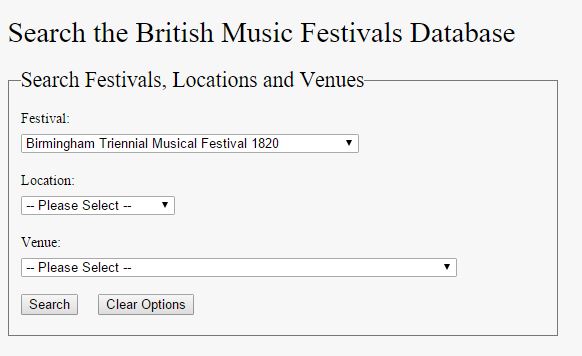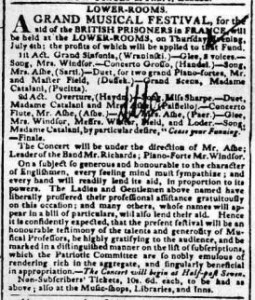When I joined the Digital Scholarship Services team last November, I knew in very general terms my goals and objectives as a Research Assistant for Dr. Charles McGuire’s Musical Festivals Database. Because the Musical Festivals Database was already established, I assumed my role in the project would be to add to the material, and eventually Dr. McGuire’s database would be complete. Now that I am a few months into the project, I can safely say my initial assumptions have been utterly challenged–working as one member of a team on such a large project has shifted my focus from the end result (a completed database) to the process of finding information and presenting it in a useful way. Without the hard deadlines of a term paper or conference presentation, working on the Musical Festivals Database has allowed me to linger in the realm of process, as I sift through the seemingly endless pages of the digital archive.
What is a Musical Festival?
Dr. McGuire gives a tidy description of Musical Festivals on the homepage of the Musical Festivals Database. He says, “Musical festivals (sometimes called choral festivals) were one of the most important means of concert music production in Britain in the 18th and 19th centuries. While the repertoire of such festivals began centered around choral performance, particularly as a celebration of Handel’s oratorios (particularly Messiah), festivals reflected contemporary British tastes with increasing selections from opera in the late 18th century and instrumental music by the mid-19th. Festivals also became an important proving ground for composers, since they offered regular commissions (from the 1830s forward), and the largest immediate audience that many could hope for, until the advent of radio broadcasting.”–http://musicalfestivals.org/ This long standing tradition poses a daunting task to the researcher, it is easy to become overwhelmed by the sheer number of musical festivals which took place over the last 321 years. However, through the use of digital newspaper archives I use my mouse and keyboard to slowly chip away at the mountain of advertisements, notices, and reviews of Musical Festivals in the early 19th century. Because I am one member of the research team, I am currently concentrating on Musical Festivals between 1810 and 1840.
Screenshot of one many search parameters in the Musical Festivals Database
How do I Research Musical Festivals?
When working with a digital newspaper archive, establishing parameters through an advanced search is a crucial step to avoid getting lost in the thousands of archived materials. I primarily use the British Newspaper Archive, curated by the British Library. http://www.britishnewspaperarchive.co.uk/ It took me several weeks of trial and error to figure out the best way to use such a resource. When I search for new festivals to add to the database, I limit my search to advertisements from a single year containing the phrase “musical festival.” While this type of advanced search would have been impossible before digital archives, it still requires a bit of detective work. Not all of the results yield new festivals, and the text recognition algorithms don’t always catch key phrases. This sort of hands-on, digging through the digital archive is very time consuming, yet necessary labor. Every time I look through the archive, I find a Musical Festival we previously didn’t know about. In this way, my archival treasure hunts have been immensely fruitful.
Advertisement for a Musical Festival in Bath, 1811.
Freedom of an Extended Timeline
After collecting the relevant data on a Musical Festival not currently in the Musical Festivals Database, I systematically create spreadsheets and word documents according to Dr. McGuire’s meticulously crafted protocols. This is perhaps the most tedious and time consuming part of my process as a Research Assistant. Spreadsheets are deceptive, what you think might take an hour to complete easily turns into three or four–as if excel was operating on a different temporal realm. Because I have no definite deadlines, I am afforded the freedom of embracing the process of this labor in all of its tedious and time-consuming glory. By continuing the processes of archival sifting, spreadsheet making, and entering data into the database, I am firmly entrenched in the liminal space between idea and completed project: the process.

